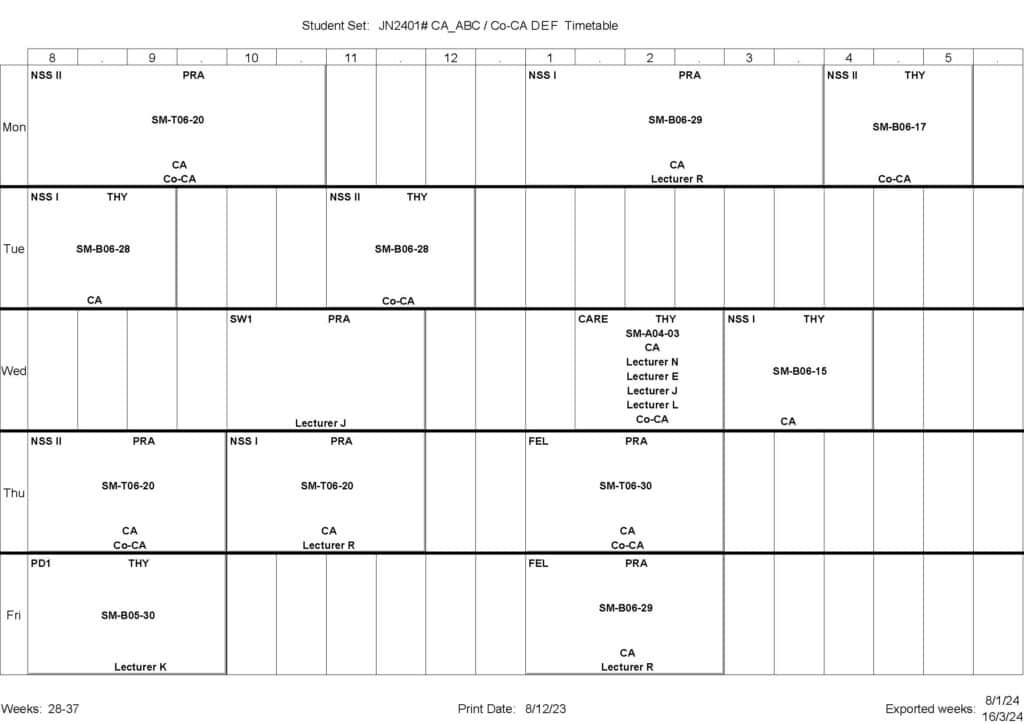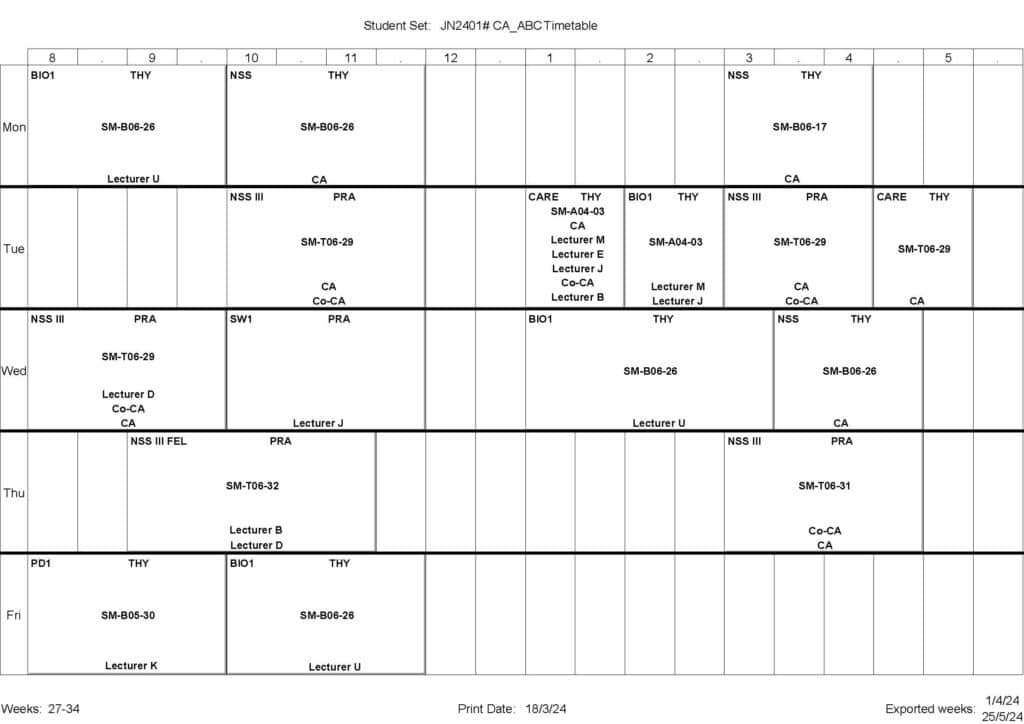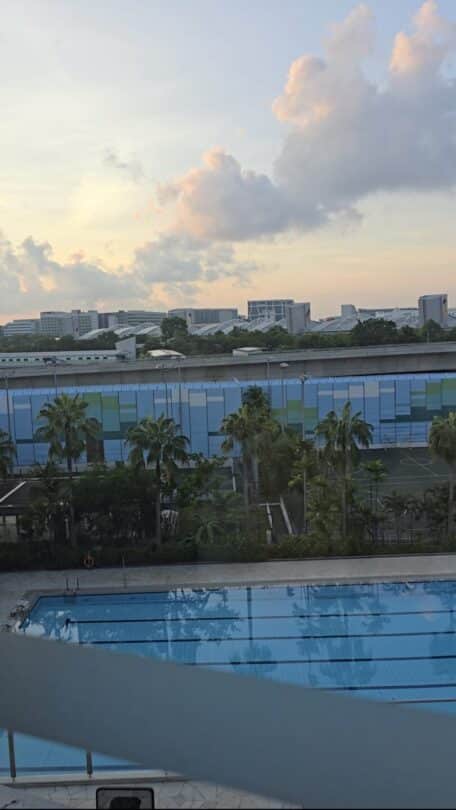Learning is a lifelong and endless journey. I am a Year 1 Higher Nitec in Nursing Student at the Institute of Technical Education (ITE) College East (Simei). It is the only school available to progress as an Enrolled Nurse. Nanyang Polytechnic and Ngee Ann Polyclinic are available for a Diploma in Nursing. Parkway College, a private education institution (PEI), used to offer a Diploma in Nursing. A Diploma in Nursing allows you to progress as a Registered Nurse (RN).
I am a sponsored student under the Career Conversion Programme for Enrolled Nurses (CCP-EN). This year, 2024, ITE has started its 3-year (January intake) and 2-year (April intake) Higher Nitec in Nursing course. The last batch of Nitec in Nursing would be the current Year 2 students. I am the first batch of January intake and started school on 8 January 2024. Nearly five months have passed without a blink, and I will share my school life as a mature student (this is what we are labelled as when we are too old 😂).
Orientation Week
On my first day, I participated in an icebreaker activity with my classmates, during which we introduced ourselves to get to know one another. The cohort of classes was grouped into Groups A and B. I was part of Group B. My class comprises 32 students (1 adult, 4 CCP Trainees, and one in-service employee sponsored directly by the hospital). Each class has its own Class Advisors (CA) and Co-CA, who will be our lecturers for the term, which lasts three months. In my class, we were grouped into groups of 4/5, and there was a class committee which consisted of the class leader, assistant class leader, lab/class officer, and assistant lab/class officer to help out with the attendance and cleanliness of the class. During the week, we were briefed on the book sale, uniform sale, photo taking for student concession cards, classroom ground rules, Behavioural and Attitudual Attributes (BAA), school rules and regulations, academic calendar, CCA signup, and the following activities were organised:
| Day | Activity |
|---|---|
| 2 | Welcome Address |
| 2 | Ice Breaking |
| 2 | ECO Orientation |
| 2 | Amazing Race |
| 2 | Time with CA |
| 3 | Police & FAS Talk |
| 3 | Performance Showcase |
| 3 | Time with CA |
| 3 | Team Building Games |
| 4 | Time with CA |
| 4 | CNB Talk |
| 5 | Cyber Security Talk |
On day 5, right after the lunch break, my class started our first practical lesson. Every practical lesson will have two lecturers and one for a theory lesson. During break time, I would encourage you to bring your food because if your break time is only one hour and falls at the peak period (1145-1300hrs), there will be a long queue and insufficient time to rest after eating.
Term 1.1 (January to March)

| Week | Schedule |
|---|---|
| 1 | Orientation |
| 5 | NSS I Practical Test (PPE) |
| 6 | NSS I Class Test |
| 7 | NSS II Practical Test (Vital Signs) |
| 8 | NSS II Class Test |
| 9 | Mask Fitting |
| 10 | Term Break (16 Mar – 31 Mar 2024) |
My lessons are from Monday to Friday, and the timetable is in 30-minute intervals. My core modules were Nursing Studies and Skills (NSS) I and II; the life skills modules were Personal and Professional Development (PD) I and Sports & Wellness (S&W) I. For CARE (we call it CARE hours), talks were given by the public, our section heads, the course manager, and the deputy director.
In NSS I, the topics covered were Infection Control, Hygiene, Grooming and Skin Integrity, Comfort Measures, Care of patients in the hospital, and The Nursing Process Framework;
NSS II were Vital Signs, Patient Safety, Collection of Specimen, Therapeutic Interventions, Perform Pain Assessment, Posture, Mobility and Ambulation, Models of Nursing, Workplace Safety, Current Health Issues, Care of Patients in the Community, and Information Technology in Nursing Care.
S&W I is simply exercising, and PPD I covers Singapore Perspectives, Presentation Skills, Financial Education, Mental Wellness, and Interpersonal Skills. The S&W and PPD modules last a semester (two terms) instead of a term.
FEL stands for Facilitated Enhanced Learning, and I will be at the simulation lab to perform our skills for NSS I and NSS II. I was given MyConnexion (e-learning) pre- and post-simulation assignments, which require me to apply the nursing process framework and Gibbs reflective cycle.
Lessons for NSS I and II are conducted on campus. Home-Based Learning (HBL) will be conducted via Microsoft Teams weekly (depending on your lecturer).
The student concession card took time; I only got it on 4 March 2024.
Moving forward to Term 1.2 (April to June)

| Week | Schedule |
|---|---|
| 4 | Biological Science I Class Test 1 |
| 5 | NSS III Class Test |
| 6 | NSS III Practical Test |
| 7 | Biological Science I Class Test 2 |
| 9 | NSS III Exam |
| 10 | Biological Science I Exam |
| 10 | Term Break (4 Weeks) |
Term 2 was a big game-changer. With no biological background, I had to put more effort into my studies. I was fortunate to have a lecturer who is a medical doctor. He explains things in a simplified way and uses mnemonics, which makes it easier to understand.
Back in Term 1.1, the weightage was:
Class Test (Written Test) – 40%, Practical Test – 50%, BAA – 10% for NSS I and II.
However, in Term 1.2:
For NSS III: Class Test 1 – 20%, Practical – 20%, Exam – 50%, BAA – 10%;
Biological Science I: Class Test 1 – 20%, Class Test 2 – 20%, Exam – 40%, BAA – 10%
BAA is based on contributing factors and is a giveaway if you report to class punctually, actively participate, and submit assignments on time.
For the practical test (also known as phase test), I had to practice four skills (Transferring patient from bed to wheelchair, Intermittent NG tube feeding, Draining urinary via urine drainage bag, and Administering oxygen therapy). On the practical test day, I had to draw lots, which was the skill I would perform. In contrast, back in Term 1.1, I only had to perform one skill: handwashing, donning and doffing of Personal Protective Equipment (PPE) for NSS I and Vital Signs for NSS II.
I want to do community service but do not know where to start. You could join CCA (Co-Curricular Activities), such as the Rotaract Club or SNA Student Chapter, which is flexible and ad hoc. It usually occurs once a month on the weekends. In ITE, there is a P.R.A.I.S.E system where you can get up to 0.2 GPA based on your CCA performance, which is a good backup plan to meet the minimum entry requirements if you want to get into the Polytechnic. A few significant events require volunteers occasionally, one of which I attended recently was the Unlabelled Run 2024, available in the Rotaract Club and SNA Student Chapter CCA. The Asia Pacific Regional Rotaract Conference (APRRC) 2024 is an upcoming event for the Rotaract Club.
Is this easy for those who have stopped studying for years? It isn’t hard if you are willing to pay attention during teaching, put in effort and learn. The lecturers are willing to provide guidance, and I don’t feel stressed. The only thing is that I had to adjust to the school environment during the first few weeks of Term 1.1, as there were many administrative matters to settle.
I am concerned about the age gap between fresh school leavers and myself. After all, there is nothing to worry about if you intend to study and you have to learn how to adapt to the environment.
Is it possible to get into the 2-year Higher Nitec from the 3-year Higher Nitec? Yes, you will be eligible with a GPA of 3.7 by the end of the first semester. This means you will complete the course in under two years and three months instead of the full three years. You will take up to two additional modules, which means everything will be cramped, and your learning pace has to be faster. It applies to CCP Trainees and is subject to approval by the relevant parties.
How do I progress into Polytechnic? As this is a Higher Nitec course, there are more pathways than in the previous Nitec course, such as:
1. A GPA of 3.0 to 4.0 allows you to study for a Diploma in Nursing for two years, and a GPA of 2.5 to 2.99 enables you to study for 2.5 years. The GPA requirement is reduced by 0.5 as compared to the Nitec course. If your GPA is below 2.499, you must have one year of work experience and pass the bridging course to study for a Diploma in Nursing for 2.5 years.
2. In October 2024, ITE will offer a new 3-year Work-Study Diploma in Nursing. Your employer must recommend you. For Nitec holders, a minimum GPA of 2.0 is required.
3. A GPA of 2.3 allows you to enter the Higher Nitec in Paramedic & Emergency Care (PEC) course.
I hope this post is informative for you 😊








